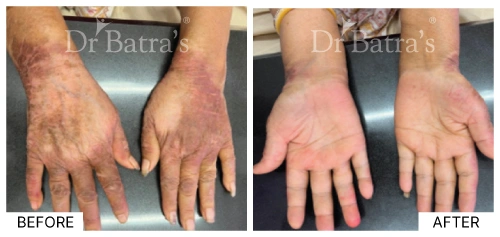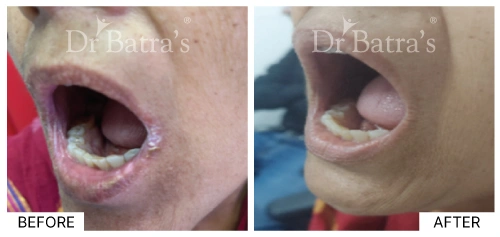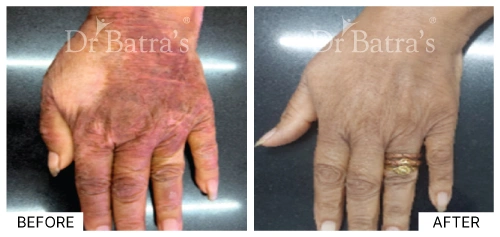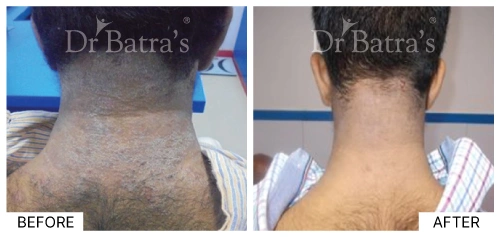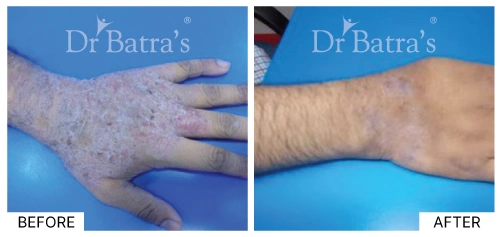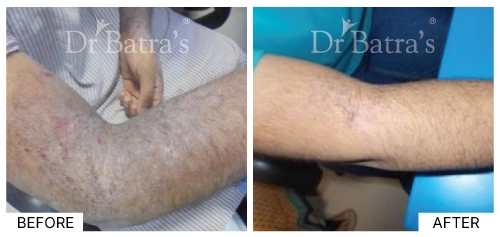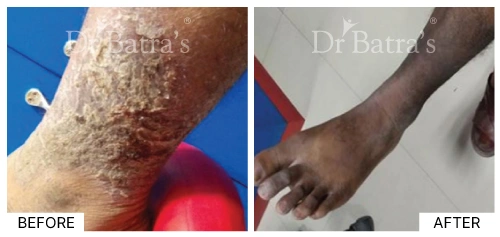Eczema Causes: Understanding the Root of Eczema
Eczema is a condition that causes the skin to become inflamed, itchy, cracked, and rough. Some variants might also result in blisters. It can affect anyone at any age and causes the skin to become red, itchy, dry, and inflamed. In most cases, it starts in infancy and continues throughout childhood.
- Eczema Causes: Understanding the Root of Eczema
- Key Causes of Eczema
- Environmental Triggers in Eczema
- Impact of Temperature and Climate
- Dry Climate and Its Effects on Skin
- Role of Stress in Eczema Development
- Risk Factors and Complications of Eczema
- Potential Complications
- FAQs
Despite not being contagious, eczema has a major effect on the skin. Infections, including warts, cold sores, and athlete's foot, may be more likely to spread to the affected skin. When there is a family history of allergies, asthma, hay fever, etc., eczema or atopic dermatitis is present. It frequently occurs alongside other allergy and hypersensitivity disorders, such as rhinitis. This article will teach us more about key eczema causes and treatment options.
Key Causes of Eczema
Different things can cause eczema, but the exact cause is unknown. Some common skin eczema causes are genetics, environmental triggers, temperature, stress, etc.
Let's explore the causes of skin eczema below.
Genetic Influences
One of the most common eczema atopic dermatitis causes is genetic influences. Genetics play a key role in the development of eczema.
Hereditary Factors and Eczema Risk
If any of your family members have a history of eczema, hay fever, or asthma, you are significantly more likely to develop eczema. In addition, gene mutations can impact skin barrier function and result in eczema.
Environmental Triggers in Eczema
Environmental factors are common causes of eczema atopic dermatitis and can intensify symptoms. Various environmental triggers, such as irritants, allergens, and more, can irritate your skin. People in urban areas with higher pollution levels are more prone to eczema.
Allergens and Irritants in the Environment
If you are exposed to allergens such as dirt, dander, dust, or pollen, it can trigger eczema flare-ups. In addition, irritants like harsh soaps, strong detergents, wool clothing, and specific chemicals can worsen eczema symptoms. Prolonged exposure to these elements can damage the skin barrier, leading to inflammation and worsening of eczema.
Impact of Temperature and Climate
Another major eczema cause is temperature and climate. Rapid temperature changes can stress your skin, leading to eczema.
How Extreme Temperatures Affect Eczema
Changes in surrounding temperature and climate are one of the primary causes of eczema and atopic dermatitis. For example, hot weather causes heavy sweating, which irritates the skin. On the other hand, cold temperatures dry the skin and reduce moisture, increasing dryness and itchiness.
Dry Climate and Its Effects on Skin
Continual exposure to dry air can lower the skin's natural moisture content, contributing to eczema. Excessive dryness frequently causes inflammation, which in turn causes itching.
Role of Stress in Eczema Development
Stress is another main reason for eczema. If you are suffering from high stress, depression, or anxiety, it will worsen your skin condition. Read on to find out how psychological stress is related to skin health and how to manage stress.
Psychological Stress and Skin Health
When stressed, your body releases cortisol and other stress hormones, which affect your immunity and increase inflammation. Some individuals experience worsening eczema symptoms and flare-ups during times of “stress.” Some people's skin may erupt simply from feeling worried about having eczema.
Managing Stress to Control Eczema Flare-Ups
To control eczema, stress must be managed. Regular exercise, meditation, and yoga can greatly decrease stress levels. Also, make sure to get enough sleep and eat a well-balanced diet.
Risk Factors and Complications of Eczema
Let's explore the risk factors and complications associated with skin eczema:
Common Risk Factors
Here are the common risk factors of eczema:
- Family History: A family member with eczema, asthma, or hay fever increases your risk of developing eczema.
- Genetics: Gene mutations can affect your skin's natural barrier, making it more vulnerable to irritants and allergens.
- Environmental Triggers: Constant exposure to environmental triggers like various allergens and irritants can worsen eczema.
- Dry Skin: Dryness increases itchiness and can lead to eczema.
- Diet: Specific foods may trigger eczema in some individuals.
- Temperature: Living in too hot or cold temperatures can affect skin conditions.
- Stress: Anxiety, depression, and stress may also cause eczema or worsen your condition.
Potential Complications
People with eczema often suffer from various complications, which are listed below:
- Food allergies
- Asthma and hay fever
- Scaling
- Chronic Inflammation
- Itchy skin
- Skin Infections
- Light or dark-coloured patches on your skin
- Sleep issues
- Rashes
- Increased stress and anxiety
Skin Infections and Chronic Inflammation
Due to constant scratching, your skin will have open wounds, cracks, or sores. A lack of a skin barrier makes your skin more prone to viruses, bacteria, and fungi, which leads to skin infections. These include eczema herpeticum, staph infections, and more. Some skin infections are very deadly and can spread to other body parts.
Eczema also causes chronic inflammation. When you scratch the itchy skin, a patch forms. Over time, the patches become leathery, discoloured, and thick.
Impact on Quality of Life and Mental Health
The constant itching and discomfort of eczema can impact your sleep, self-esteem, and overall quality of life. It also leads to heavy anxiety and depression. For example, some individuals will likely lose self-confidence due to their patchy skin. In addition, the chronic skin condition can induce psychological stress in individuals, leading to social anxiety and depression.
Why Choose Dr Batra's® for Your Eczema Treatment?
Personalised Homeopathy Treatments
At Dr Batra's®, we offer personalised homeopathy treatments for eczema. Our skin doctor will examine your skin condition based on the skin analysis system report. A personalised homeopathy eczema treatment plan will be developed depending on your symptoms, the severity of the skin condition, and previous medical history.
Dr Batra's® Derma Heal is a light therapy for your skin that can reduce itchiness and redness and cure scars and blisters. Topical homeopathic creams can also ease your eczema symptoms, improve your skin texture, and treat the underlying cause of your skin disease.
Expert Team of Homeopathic Doctors
At Dr Batra's®, we have professional homeopathic doctors with several years of experience. They will physically examine your skin, conduct computerised tests, and create a tailored eczema treatment plan. Our expert team is trained to treat the physical symptoms and the psychological and emotional triggers related to eczema.
Medically Reviewed

Qualification
-
B.H.M.S (Maharashtra University of Health Sciences)
-
FCHD (Fellowship in Homeopathic Dermatologist - Mumbai)
References
- https://www.ncbi.nlm.nih.gov/books/NBK279399/
- https://kidshealth.org/en/parents/eczema-atopic-dermatitis.html
- https://my.clevelandclinic.org/health/diseases/9998-eczema
- https://www.mayoclinic.org/diseases-conditions/atopic-dermatitis-eczema/diagnosis-treatment/drc-20353279
- https://nationaleczema.org/eczema/treatment/
FAQs
What is the main cause of eczema?
Eczema is related to a gene variation or an immune response that affects the skin’s ability to protect against allergens. This allows your skin to be affected by environmental factors and irritants. In some children, food allergies may also play a major role as an eczema cause. Many people with eczema have a family history of allergies, asthma, or even atopic dermatitis. They also tend to have sensitive skin that gets easily irritated, a major cause of eczema. For an effective and long-lasting effect, it is recommended that people with atopic dermatitis consult an expert to evaluate the causes of eczema.
What foods are causes of eczema or dermatitis?
You may have flare-ups or worsening eczema after consuming certain inflammatory foods and components. These include dairy, red meats, fish, soy, eggs, peanuts, refined carbs, gluten, and soy products. Dietary allergies can also induce an inflammatory reaction.
Can atopic dermatitis cause other diseases?
In severe cases of chronic conditions, the symptoms of eczema are also severe in that they damage the protective layer the skin provides to the body. In such cases, there may be an increased risk of other infections affecting the body.
Is eczema a fungal infection?
Even though fungal infections cause itchy skin, they are very different from eczema. Fungal infections and allergic reactions that cause itching can always be mistaken for eczema. Eczema, however, is a chronic condition that requires long-term treatment.
What is the best medicine for eczema?
Conventional medicine for eczema includes steroid creams and topical corticosteroids. However, these treatments can have many side effects and are usually temporary. They aim to suppress the condition rather than treat it from the root. Some doctors may also advise avoiding triggers associated with eczema. Homeopathy medicines are proven to be very effective in the treatment of eczema. They treat the condition from the root, prevent any recurrence, and are free of side effects.
Is mental stress a reason for eczema?
Studies have shown that mental stress and eczema are closely linked. Mental stress can trigger eczema, which can, in turn, cause more mental stress. The itching associated with eczema can not only be embarrassing but can also keep one awake at night, thereby reducing the quality of sleep. Eczema's visible oozing and sores can also leave one socially embarrassed. Modern medicine needs to pay more heed to the mind-body connection. Homeopathy is a holistic system of medicine that considers your mental and emotional condition while treating your eczema.
Is dyshidrotic eczema contagious?
Dyshidrotic eczema, also known as acute palmoplantar eczema or pompholyx, is a type of chronic eczema that is not contagious. This long-term skin condition results in a certain form of inflammation. The symptoms of this disease can be controlled in most patients with the right homeopathy treatment.
What triggers dyshidrotic eczema?
The exact cause of dyshidrotic eczema is unknown. It might happen as a result of the following extrinsic triggers:
- Increased stress
- Allergies, including hay fever and asthma
- Frequently moist or sweaty hands and feet
- Exposure or contact with certain substances (allergens), including cement, nickel, cobalt, or chromium.
Can stress bring on dermatitis?
Eczema is not directly caused by emotional stress, although it can cause its symptoms to appear. When under great stress, the body produces a hormone called cortisol, which causes inflammation all over the body. This inflammation may result in a flare-up of eczema. Try deep breathing, meditation, resting, relaxing, and regular exercise to deal with stressful situations.
What causes eczema flare-ups?
Here are the common triggers of skin eczema flare-ups:
- Irritants
- Allergens
- Dry skin
- Cold and hot weather
- Infections
- Stress and anxiety
How commonly does eczema occur?
Eczema is most common in children, especially infants, affecting up to 15% of children. Eczema also affects adults, but it is most prominent in kids. It often starts in childhood, between the ages of 1 and 5, and can worsen later.
Is eczema hereditary?
Yes. Eczema is a hereditary skin condition. In most cases, if parents have eczema, there is a 50% risk that the kids will suffer from the skin condition as well. As a result, if any of your family members have eczema, you might also develop it.
Can diet and lifestyle influence the development of eczema?
Yes. Studies have found that certain foods, such as chocolate, milk, cheese, shellfish, peanuts, glutinous rice cake, eggs, yoghurt, potato chips, etc., are likely to worsen eczema symptoms. So, it is recommended that you eat a well-balanced diet and avoid foods that can trigger your symptoms.
Avoiding heavy, fragrant soaps, shampoos, and other skincare products can relieve skin eczema symptoms. Also, getting enough sleep and managing stress can improve your skin condition.
